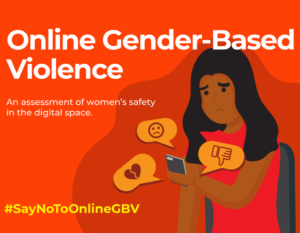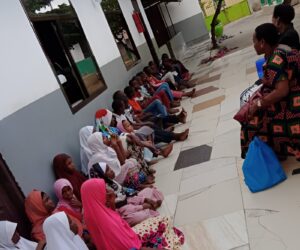


Understanding Online GBV
Online gender-based violence (GBV) comprises a range of harmful behaviors and harassment directed at individuals due to their gender. This encompasses cyberstalking, online harassment, the unauthorized sharing of intimate images, and sending threatening messages, among other actions. These behaviors not only infringe upon a person’s rights and dignity but also have the potential to cause severe psychological trauma.
The Case In Tanzania
Unfortunately, the true extent of the issue remains hidden due to inadequate reporting, often driven by fear of retaliation, shame, and the lack of legal and institutional backing.
The data gathered from over 500 women actively involved in the Women at Web project from 2018 to 2022, supported by DW Akademie and German Cooperation, highlighted online gender-based violence as a significant obstacle to meaningful connectivity for women, ranking second only to digital literacy. Implemented across Tanzania, Uganda, Rwanda, and Kenya, the Women at Web project aimed to promote women’s online participation and amplify their stories.
Impact on Victims
Online GBV transforms digital spaces from potential zones of comfort and opportunity into areas of distress, leaving victims feeling vulnerable and violated in their own homes. The psychological impact can be profound, leading to anxiety, depression, and even self-harm. Furthermore, these attacks often aim to silence and marginalize victims, depriving them of the opportunity to participate in digital spaces freely and productively.


Our program seeks to create safe online spaces for women and girls in Tanzania to take control of their digital lives and participate fully in the social, economic, and political opportunities that the digital age has to offer.
TACKLING THE PROBLEM
Public Education and Awareness: Educating individuals about online gender-based violence, its impact on victims, and how to recognize and report such behavior.
Legislative procedures: Legislative measures play a vital role in defining and penalizing online gender-based violence (GBV). Tanzania has taken steps forward with the Cybercrimes Act of 2015, which addresses cyberbullying and online harassment. However, to enhance effectiveness, it’s essential to include specific sections that clearly outline the types of online GBV and technology-facilitated harassment targeting women.
Promote Digital Literacy: We aim to teach digital literacy skills to help individuals navigate online spaces safely, recognize potential risks, and protect their privacy and security. Our focus in capacity building is also on safety training programs. These programs aim to empower women and girls, providing them with the knowledge and tools to protect themselves online. They are taught how to use privacy settings effectively, identify potential threats, and report incidents of online GBV.
Hotlines and Support Services: FCF’s objective is to create a hotline and support services for victims of online gender-based violence in collaboration with AREPEB, which offers legal aid for accessing justice.. We also work with volunteer therapists who provide counselling to the victims. These services provide immediate assistance, guidance, and counseling to those who have experienced digital violence.
Engage Technology Companies: Collaborate with technology companies to develop and implement tools and policies that prevent and address online gender-based violence, such as content moderation, reporting mechanisms, user education and community guidelines. We aim to push globally for a need of tech companies to take more responsibility for online safety.
Research and Data Collection: Conducting research and collecting data on online gender-based violence to better understand its prevalence, impact, and effective interventions here in Tanzania. The evidence collected from this research and report will be used to advocate for stronger laws and policies, better implementation of existing regulations, and targeted interventions to address the problem.
The work towards this goal has begun, and it is up to all of us, governments, civil society, tech companies, and individual users, to contribute to this effort.
Donate: Your financial support fuels our fight against VAC and empowers us to reach more children in need.
Volunteer: Share your skills and passion by volunteering for our programs and community initiatives.
Raise Awareness: Spread the word about VAC and the work of FCF. Talk to your family, friends, and community members.
Advocate: Join your voice to ours in advocating for stronger policies to protect children.

Inspired by the esteemed President of Tanzania,